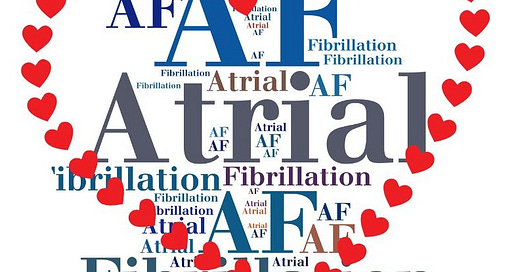As we celebrate Valentine’s Day and American Heart Health Month, I want to talk about my heart—not just in the metaphorical sense, but in a very real, personal way. What began as occasional heart rhythm disruptions became a life-altering battle with atrial fibrillation (AFib), reshaping my entire perspective on what it means to have a healthy heart.
The Unexpected Diagnosis
Imagine my surprise and dismay when about 8 years ago I found myself grappling with a serious cardiac condition despite my maintaining a healthy lifestyle—regular exercise, balanced nutrition, maintaining a healthy weight, and consistent medical check-ups. Anyone—including me—thought I was the “picture of health.”
I was doing everything “right.” So how could I possibly have a problem with my heart?
Life has a way of humbling us. AFib wasn't part of my life plan, but it became my reality—and an all-consuming affliction that would affect my life in unimaginable ways.
Understanding AFib: An Electrical Storm
Think of the heart as a house with both electrical and plumbing systems. In my case, the plumbing—the physical structure of my heart—was (and still is) sound. The problem lay in the electrical system. Instead of maintaining a steady, rhythmic beat, my heart’s upper chambers would quiver chaotically, sometimes racing to dangerous speeds exceeding 200 beats per minute.
These episodes were more than just physically taxing—they were emotionally devastating. Imagine your heart suddenly deciding to run a marathon at top speed while you’re trying to go about your daily life!
The unpredictability was perhaps the cruelest aspect; every day became a question of, “Will it happen today?” As it progressed, the question became, “When will it happen today?” And then, “Will it stop for at least awhile today?”
I stopped driving, fearing an episode would strike while I was behind the wheel. My world began to shrink as anxiety and AFib formed a vicious cycle.
The Progressive Nature of AFib
AFib isn’t merely an inconvenience—it’s a potentially devastating condition that turned my life upside down. Every episode left me dizzy, short of breath, and lightheaded—sometimes so severely that I could barely stand. The sensation of my heart racing out of control was terrifying; there’s nothing quite like the primal fear of feeling your own heart malfunction.
Beyond the immediate physical symptoms, AFib carries a serious hidden danger—the risk of stroke. When the upper chambers of the heart quiver instead of pumping properly, blood can pool and form clots. These clots can travel to the brain, with catastrophic consequences.
What started as occasional episodes (paroxysmal AFib) progressed into something far more sinister: persistent Afib that became an unyielding presence in my life.
Like many chronic conditions, AFib typically worsens over time, and my experience was no exception. What began as intermittent disruptions gradually transformed into a continuous affliction that dominated every aspect of my life. Each day became a exercise in managing fear and uncertainty, never knowing when the next episode would strike, how long it would last, or how severe it would be.
The Hidden Burden
What I rarely talked about then was the shame. Despite knowing better, I felt embarrassed about my condition, as if my irregular heartbeat was somehow a personal failure. I kept it quiet, sharing it with as few people as possible. Looking back, I can see how irrational these feelings were, but at the time, they felt overwhelming. I somehow believed that having AFib made me “less than”—that I had failed myself and the people I love.
These feelings of shame only amplified the physical and emotional toll of the condition. It’s strange how we can know intellectually that a health condition isn’t our fault, yet still carry that burden of perceived failure. Now I understand that these feelings, while common, only add an unnecessary layer of suffering to an already challenging situation.
My Path to Treatment
I initially resisted the idea of cardiac ablation, throwing myself into every possible alternative. Medications, lifestyle modifications, supplements, acupuncture—you name it, I tried it. But nothing worked. Nothing even came close.
Meanwhile, my AFib continued its relentless progression, and my quality of life continued downward. I was exhausted, frustrated, and scared. AFib wasn’t just affecting my heart—it was consuming every aspect of my life: physical, mental, and emotional.
Desperation has a way of bringing clarity. I finally reached a point where I had to face reality: if I wanted any chance of reclaiming my pre-AFib life, ablation was my best shot. Even though there were no guarantees the procedure would work, I knew I had to try.
This realization led me to do extensive research to find one of the best electrophysiologists in the country—a cardiologist with specialized training in cardiac electrical disturbances. When I found the right doctor, I discovered there was a several-month waiting list for the procedure. But I knew in my gut that this was the physician I wanted performing my ablation. This doctor represented my best chance of kicking AFib to the curb.
So I got on the waiting list, and during those long months of waiting, my AFib continued its ruthless progression. Each episode seemed to mock my patience, but I held onto the hope that help was coming.
My Ablation Journey
Cardiac ablation is a sophisticated procedure that targets the problematic areas in the heart that are causing irregular electrical signals. In my case, the doctor used radiofrequency ablation—a technique that employs heat energy to create precise scars in the heart tissue, effectively blocking the faulty electrical signals that were causing my AFib. Think of it as rewiring the heart’s electrical system to restore its natural rhythm.
My path wasn’t straightforward. I’d hoped for “one and done;” but I required two ablations to fully address my aggressive, complicated AFib.
My belief in my doctor never waivered. And my confidence in the skill of this talented man was warranted. After the second ablation my Afib was gone.
What a relief! There are no words that can fully describe how good it feels to have a regular heartbeat and my life back.
The Blood Thinner Challenge
Post-ablation, I faced another hurdle: the need for lifelong blood thinners. I deplored being on them, but stopping wasn’t an option for me, even after my successful ablation.
The reason? Part of my treatment involved isolating my left atrial appendage (LAA), a small pouch where blood can pool and clot. Once that area is isolated, blood thinners are required for life.
Enter the Watchman device: an implant that permanently seals off the LAA, eliminating the need for daily blood thinners while maintaining protection against strokes.
While it involved another procedure, I carefully weighed the risks and benefits of the implant versus a lifetime of taking blood thinners. For me the Watchman implant was the way to go.
Life After AFib
Today I feel fantastic! It’s been over 5 years and my heart continues to beat with a steady rhythm that I no longer take for granted. While I’m aware that new electrical issues could develop, I don’t worry or even think about it.
And if AFib ever does make a comeback, I know exactly how to respond: I’ll get another ablation in a heartbeat!
A Special Note for Postmenopausal Women
My journey has made me particularly aware of how heart health affects postmenopausal women. Many don’t realize that after menopause, our risk for heart conditions—including AFib—increases significantly. The hormonal changes that come with menopause can affect our cardiovascular system in ways that aren’t always obvious or widely discussed.
This is why I’m especially passionate about encouraging women to be proactive about their heart health after menopause. Don’t dismiss irregular heartbeats or other cardiac symptoms—and don’t let your doctor dismiss them—as just a “normal part of aging.” Our hearts deserve the same attention we give to other aspects of our health, and early intervention can make all the difference.
According to a research study published in the Journal of the American Heart Association, after menopause an estimated 1 in 4 women may develop AFib in their lifetime, with stressful life events and insomnia being major contributing factors.
In addition to increasing the risk of blood clots and stroke, AFib can also lead heart failure or other cardiovascular complications. More than 12 million people in the U.S. are expected to develop atrial fibrillation by 2030, according to the American Heart Association. And age is a contributing factor both for women and men.
A Message of Hope
Heart health often remains abstract until it becomes personally relevant. We often take our hearts for granted until something goes wrong. Even when we do everything “right” and take care of our bodies, things can unexpectedly go awry with our health.
For those currently battling AFib, please know that options exist. The key is finding the right medical team, educating yourself about treatment options, and refusing to accept a diminished quality of life as your new normal.
I’m grateful every day that I made the choices I did, and I encourage those struggling with AFib to do their homework and explore their options.
This Valentine’s Day, as others exchange cards and chocolates, I’m celebrating a different kind of heart story—one of survival, strength, and healing. Each steady beat in my chest reminds me of how far I’ve come. Sometimes our greatest challenges show us what we’re truly capable of enduring and overcoming. ❤️






I never take heart health for granted, but it scares me to delve into researching it further in post-menopausal state. I have a less than stellar doctor sho does not believe in testing much of anything. I have these weird tinges in my heart and of course after telling him his response was "it's part of agin" which what his standard response is to all my concerns. The thing is, is that not everything is natural aging. As someone recently stated, it's the innocuous symptoms we must pay attention to. I'm guilty as charged in letting things go. I'm in the process of finding a new doctor, but living there in the middle of nowhere has its challenges. Great writing, but I "felt" that article with every word read, so you did your job beautifully. Scary stuff.
Daria, Thank you for the excellent podcast about your journey with afib. Would you be willing to share the name of the doctor who performed your successful ablation and/or the name of the medical facility where you had the ablation and Watchman procedure done? That information would be invaluable! Thank you, Kathy Campbell